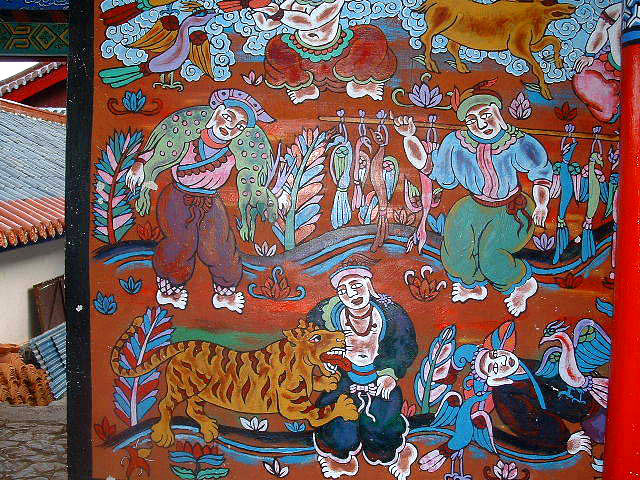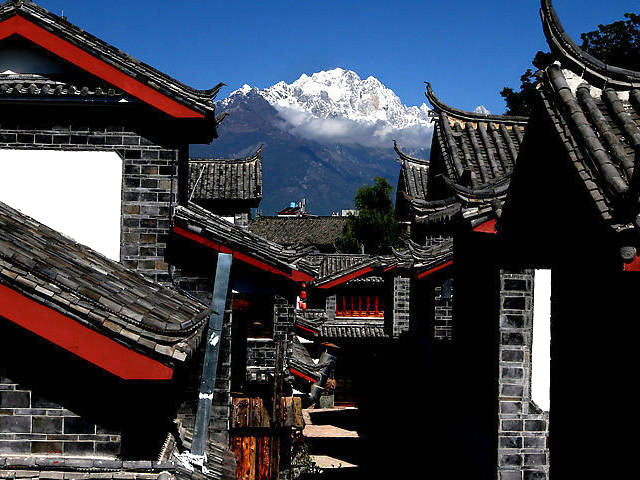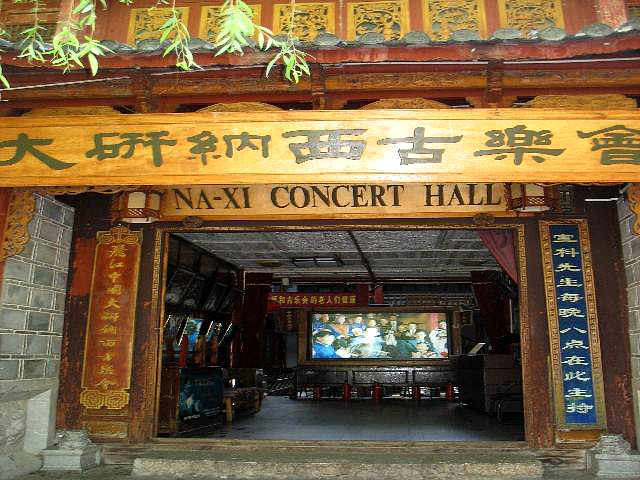Baisha Mural Paintings
As one of three ancient towns, Baisha has its unique aspect that there are many Mural Paintings in temples. Most of the temples were built from the early days of the Ming Dynasty (1368-1644) to the early Qing Dynasty (1644-1911), and the Mural Paintings were created at the same time, over the course of about 300 hundred years. In Lijiang, it was an era of rapid economic development, mutual acculturation of multinational culture, and the growth of religions.
Accordingly, Mural Paintings was an artistic representation of this cooperation, communication and progress. The authors of these mural paintings had come from different nations, including the local Naxi Dongba painters; the Taoist painter Zhang from the Central Plain; Tibetan Lama artist Guchang; Han painters Ma Xiaoxian and Li Zeng; and many other artists who were unknown to the public.
 |
 |
| Baisha Murals embody a kind of life of Naxi people | Baisha Murals in Lijiang |
The originality and figures of the mural paintings reflect the different religious cultures and artistic forms of Buddhism, Lamaism, Daoism and the Naxi Dongba religion, as developed in a Naxi school. Therefore, Lijiang Mural is quite different from other frescos. Each painting includes at least one hundred portraits, but perspective is used very well, and the close, middle and establishing images are clear. The various lifelike portraits are not only Buddhas but also ordinary people such as bureaucrats, criminals, tourists and executioners. Many of the scenes and subject matters are drawn from daily life-people are shown fishing, riding horses, weaving, dancing and casting iron. The painters used different methods of portrayal within the different elements of the fresco, such as flesh, garments, jewelry, weapons and many other components. The style of these true-life frescos is rural and unconstrained; the colors are strong and have intense contrast but are also unified.
The Lijiang Mural fully demonstrates the superb artistic skills, outstanding creativity and rich imaginations of these excellent craftsmen. The vivid and exact figures, flowing lines, well-defined colors and powerful effects of the exquisite details make the Lijiang Mural not only the rare treasure of art, but also forceful proof of national solidarity and an important source of information for research on national religions, arts and history.
Select Other Favorite Attractions
| China tours with Lijiang | |||||||||||||
|
|||||||||||||
|
|||||||||||||
|
|||||||||||||
|
|||||||||||||
Guide for Yunnan tour, offers most value & amazing experience. In China, you can rely on us
Copyright © 2001 - 2025. All Rights Reserved to ChinaTourGuide.Com
China Business Travel China Travel | Travel in China | China Tour | Beijing Tours | Shanghai Tours | Guilin Tours | Suzhou Tours | Hangzhou Tours |
Canton Fair | Canton Fair 2025 | Tibet Tours | Yunnan Tour | Hongkong travel | Xian Tours | Guizhou Tours | Hong Kong Hotels | 香港酒店 | 广州酒店
Chinatourguide.com, guide to everything you need to know about China tour, Your reliable China travel agency.





